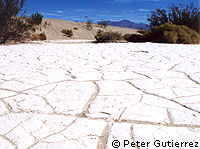No return for Gaia?
The British scientist James Lovelock has published the most pessimistic outlook yet for the future of the Earth's environment. Based on his groundbreaking and controversial 'Gaia' theory, Dr Lovelock now believes that humankind has damaged the Earth irrevocably and that the systems the Earth uses to regulate itself are now working in tandem with global warming systems to accelerate that warming. Dr Lovelock postulated his 'biocybernetic universal system theory' in the late 1970s. The theory developed from work on the Martian atmosphere, where he noted vast quantities of carbon dioxide (CO2), in sharp contrast to the atmosphere on Earth. This led him to reconsider the Earth's eco-system. The resulting theory takes the Earth's eco-system as a single, massive, living entity, able to regulate itself. He rechristened the theory 'Gaia' after a suggestion from his neighbour - the novelist William Golding. 'Aerosol pollution of the northern hemisphere reduces global warming by reflecting sunlight back to space. This 'global dimming' is transient and could disappear in a few days like the smoke that it is, leaving us fully exposed to the heat of the global greenhouse. We are in a fool's climate, accidentally kept cool by smoke, and before this century is over billions of us will die and the few breeding pairs of people that survive will be in the Arctic where the climate remains tolerable,' Dr Lovelock wrote in the UK newspaper the Independent. While most researchers have limited themselves to examining how specific processes are working and how parts of the climate may be warming, Dr Lovelock is taking a holistic view, on how the whole system is operating under stress. The 'global dimming' phenomenon, Dr Lovelock postulates, could be further accelerated if the ice caps begin to suffer further depletion. Because the ice caps are a bright white, they, too, reflect light and heat back into space. To lose the ice-caps and the 'global dimming' phenomenon could be a fatal feedback-loop. Dr Lovelock's research has examined historical records, and found that the Earth has been in a similar position before, and that the recovery was slow - some 100,000 years - enough time for life as we know it to have ended. 'We are responsible and we suffer the consequences: as the century progresses, the temperature will rise 8 degrees centigrade in temperature in temperate regions and 5 degrees in the tropics,' he says. Dr Lovelock's predictions do not, unfortunately, provide a way out of this situation. 'I cannot see the US or the emerging economies of China and India cutting back in time, and they are the main source of emissions,' says Dr Lovelock. While Dr Lovelock has remained a cause célèbre for the Environmental movement, he remains a strong advocate for the nuclear industry, as a means of creating emissionless power. 'The notion there is land to spare to grow biofuels, or be the site of wind farms, is ludicrous.' Dr Lovelock has also tried to build bridges with the evolutionists, who were damning of his initial Gaia theory as it presumed a kind of global 'intelligence' and altruism. Dr Lovelock now says that organisms can change their environment as well as adapt in it, and the Earth can be viewed as constantly evolving as a consequence.
Countries
China, India, United States



